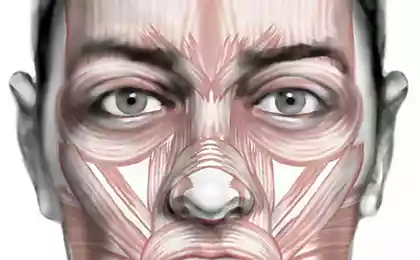670
To get rid of excessive optimism, rinse with cold water left ear
Too optimistic? Science is ispravit
Like most people, you probably suffer from "excessive optimism". This tendency to healthy adults underestimate the likelihood of any future disaster, such as illness. Fortunately, scientists have not only figured out what part of the brain responsible for this behavior, they also learned how to stop it. This can be done by stimulating the right inferior frontal gyrus (the area of the brain that is located in the temple), which should be rinsed with cold water left ear (but not right). It makes people much less optimistic, careless.
In general, the phenomenon of excessive optimism is qualitative similarity with anosognosia, a neurological disorder that is characterized by the fact that the patient can not critically assess the course of their disease. Excessive optimism and anosognosia independently associated with inferior frontal gyrus, right. In addition, anosognosia temporarily suppresses vestibular stimulation, especially when washing the left (not right) ear with cold water. This procedure has long been used to activate the lower right lobe. Therefore, it has been hypothesized that thermal stimulation can reduce the excessive optimism in healthy people.
To test the hypothesis selected 31 participants, with all the participants were right-handed. All of them were subjected to stimulation of both ears in cold water, in turn. During each episode stimulate participants rated their own risk of disease in the future. The experimental results were as follows: average level of risk was much higher when participants washed the left ear. Whereas during the washing of the right ear results of the risk assessment remained unchanged. Thus, excessive optimism was significantly reduced by stimulating the left ear with cold water. Also, the experiment indicated the presence of a unitary mechanism that lies at the base of both anosognosia and excessive optimism, and this suggests that an excess of optimism is a form of subclinical anosognosia, with all the potential symptoms.
via factroom.ru

Like most people, you probably suffer from "excessive optimism". This tendency to healthy adults underestimate the likelihood of any future disaster, such as illness. Fortunately, scientists have not only figured out what part of the brain responsible for this behavior, they also learned how to stop it. This can be done by stimulating the right inferior frontal gyrus (the area of the brain that is located in the temple), which should be rinsed with cold water left ear (but not right). It makes people much less optimistic, careless.
In general, the phenomenon of excessive optimism is qualitative similarity with anosognosia, a neurological disorder that is characterized by the fact that the patient can not critically assess the course of their disease. Excessive optimism and anosognosia independently associated with inferior frontal gyrus, right. In addition, anosognosia temporarily suppresses vestibular stimulation, especially when washing the left (not right) ear with cold water. This procedure has long been used to activate the lower right lobe. Therefore, it has been hypothesized that thermal stimulation can reduce the excessive optimism in healthy people.
To test the hypothesis selected 31 participants, with all the participants were right-handed. All of them were subjected to stimulation of both ears in cold water, in turn. During each episode stimulate participants rated their own risk of disease in the future. The experimental results were as follows: average level of risk was much higher when participants washed the left ear. Whereas during the washing of the right ear results of the risk assessment remained unchanged. Thus, excessive optimism was significantly reduced by stimulating the left ear with cold water. Also, the experiment indicated the presence of a unitary mechanism that lies at the base of both anosognosia and excessive optimism, and this suggests that an excess of optimism is a form of subclinical anosognosia, with all the potential symptoms.
via factroom.ru























